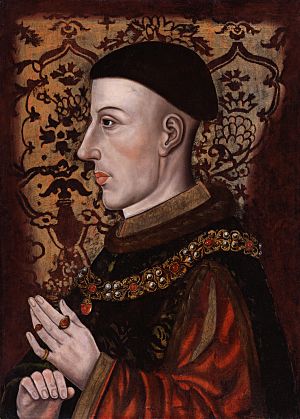Le Roy Engloys facts for kids
The song Le Roy Engloys is a very old French song. It was written around the late 1400s. This was just a few decades after the end of the Hundred Years' War. The song is part of a big collection called the Bayeux Manuscript. This collection has over a hundred songs. It was put together by Charles III de Bourbon in the early 1500s.
Contents
The Story Behind "Le Roy Engloys"
This song tells a story about the English King Henry V. He was a key figure in the Hundred Years' War. The song talks about how he wanted to be king of France too. It also describes the French people fighting back.
Why the Song Has Mistakes
The song was written about 50 years after the events it describes. Because of this, it has some historical mistakes. For example, the song says King Henry V died in Saint-Fiacre in Brie. But he actually died in Vincennes.
Another part of the song mentions "Captain Prégent." This is Prigent VII de Coëtivy. He was a French leader. He helped win the Battle of Formigny on April 18, 1450. In that battle, many English soldiers were defeated. The song uses a word for "tails," which sounds like the French word for "coward." This was a way to make fun of the English.
What the Song Says
The song is written in Middle French. It tells a story from the French point of view. It celebrates the French victory over the English. It also makes fun of the English king and soldiers.
First Part: The English King's Claim
The song starts by talking about the English King. He called himself the King of France. He wanted to force the French people out of their own country.
| Original lyrics in Middle French | English translation |
|---|---|
|
Le Roy Engloys se faisoit appeler |
The English King named himself |
Second Part: The King's End and French Victory
Then, the song says the English King died. It celebrates that the English were pushed out of France. It says that no one talks about the "English tails" anymore. This means the English were defeated and forgotten.
| Original lyrics in Middle French | English translation |
|---|---|
|
Or est-il mort à Sainct-Fiacre en Brye, |
But he died in Saint-Fiacre in Brie, |
Third Part: English Preparations
The song then talks about the English getting ready for battle. They loaded their cannons onto ships. They brought lots of food like biscuits. They sailed towards Biscay to crown their new young king.
| Original lyrics in Middle French | English translation |
|---|---|
|
Ils ont chargé l’artillerie sur mer, |
They have charged the artillery to the sea, |
Fourth Part: French Victory and Defeat of the English
Finally, the song says the English efforts were useless. Captain Prégent fought them very well. The English were completely defeated on land and at sea. The song ends by saying their efforts failed.
| Original lyrics in Middle French | English translation |
|---|---|
|
Mais leur effort n’est rien que moquerie : |
But their effort is nothing but mockery: |
 | Tommie Smith |
 | Simone Manuel |
 | Shani Davis |
 | Simone Biles |
 | Alice Coachman |


